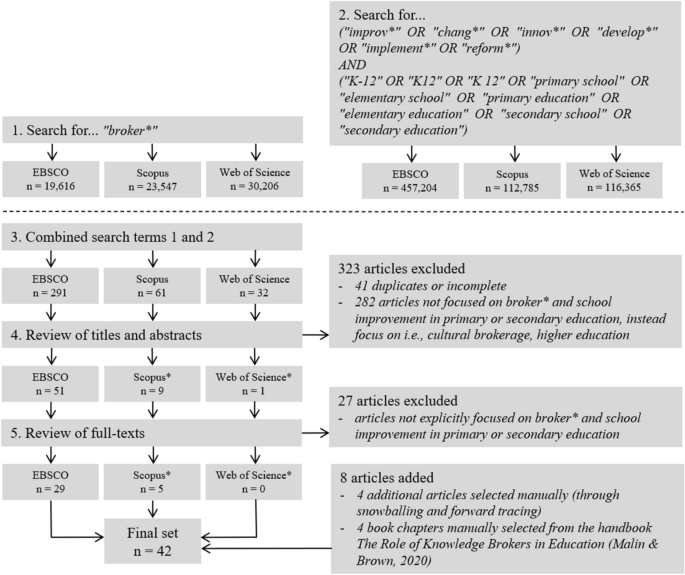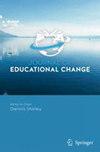Bridging gaps: a systematic literature review of brokerage in educational change
IF 2.5
2区 教育学
Q1 EDUCATION & EDUCATIONAL RESEARCH
引用次数: 0
Abstract
Abstract Bridging gaps between educational stakeholders at the classroom, school, and system levels is essential to achieve sustainable change in primary and secondary education. However, transferring knowledge or building capacity within this network of loosely coupled stakeholders is demanding. The brokerage concept holds promise for studying these complex patterns of interaction, as it refers to how specific actors ( brokers ) link loosely coupled or disconnected individuals ( brokering ). However, different research traditions, in terms of theoretical frameworks and methodological approaches, and various stakeholders examined in their role as bridge builders make understanding the role of brokers, brokering, and brokerage in changing educational practice challenging. Therefore, the purpose of this study is to provide an overview of the current literature on these concepts in educational change research. In a systematic literature review based on 42 studies, we analyzed each study’s theoretical assumptions, methodological approach, scope in terms of stakeholders involved, and empirical findings. First, the literature review revealed that research on educational change refers to four different theoretical frameworks when focusing on brokers, brokering, or brokerage. Second, our results indicate that predominantly qualitative approaches have been applied. Third, using content network graphs, we identified teachers and principals as among the most frequently analyzed brokers. Fourth, four relevant aspects of the empirical findings are presented: brokers’ personal characteristics, conditions that enable brokering, successful brokering strategies, and outcomes of brokerage. Finally, we outline a future research agenda based on the empirical evidence base and shortcomings.

弥合差距:教育变革中经纪的系统文献综述
弥合课堂、学校和系统各级教育利益相关者之间的差距对于实现中小学教育的可持续变革至关重要。然而,在这个松散耦合的利益相关者网络中转移知识或建立能力是有要求的。代理概念为研究这些复杂的交互模式带来了希望,因为它指的是特定的参与者(代理)如何连接松散耦合或断开连接的个体(代理)。然而,就理论框架和方法方法而言,不同的研究传统,以及作为桥梁建设者的各种利益相关者,使得理解经纪人、经纪和经纪在改变教育实践中的作用具有挑战性。因此,本研究的目的是对当前教育变革研究中这些概念的文献进行概述。在基于42项研究的系统文献综述中,我们分析了每项研究的理论假设、方法方法、涉及利益相关者的范围以及实证结果。首先,通过文献回顾发现,教育变革研究在关注经纪人、经纪业务和经纪业务时,涉及到四种不同的理论框架。其次,我们的结果表明,主要是定性的方法已经应用。第三,使用内容网络图,我们确定教师和校长是最常被分析的经纪人。第四,提出了经纪人个人特征、经纪条件、成功经纪策略和经纪结果四个相关方面的实证研究结果。最后,基于实证基础和不足,提出了未来的研究方向。
本文章由计算机程序翻译,如有差异,请以英文原文为准。
求助全文
约1分钟内获得全文
求助全文
来源期刊

Journal of Educational Change
EDUCATION & EDUCATIONAL RESEARCH-
CiteScore
5.80
自引率
7.10%
发文量
23
期刊介绍:
The Journal of Educational Change is an international, professionally refereed, state-of-the-art scholarly journal, reflecting the most important ideas and evidence of educational change. The journal brings together some of the most influential thinkers and writers as well as emerging scholars on educational change. It deals with issues like educational innovation, reform and restructuring, school improvement and effectiveness, culture-building, inspection, school-review, and change management. It examines why some people resist change and what their resistance means. It looks at how men and women, older teachers and younger teachers, students, parents and others experience change differently. It looks at the positive aspects of change but does not hesitate to raise uncomfortable questions about many aspects of educational change either. It looks critically and controversially at the social, economic, cultural and political forces that are driving educational change. The Journal of Educational Change welcomes and supports contributions from a range of disciplines, including history, psychology, political science, sociology, anthropology, philosophy and administrative and organizational theory, and from a broad spectrum of methodologies including quantitative and qualitative approaches, documentary study, action research and conceptual development. School leaders, system administrators, teacher leaders, consultants, facilitators, educational researchers, staff developers and change agents of all kinds will find this journal an indispensable resource for guiding them to both classic and cutting-edge understandings of educational change. No other journal provides such comprehensive coverage of the field of educational change.
 求助内容:
求助内容: 应助结果提醒方式:
应助结果提醒方式:


